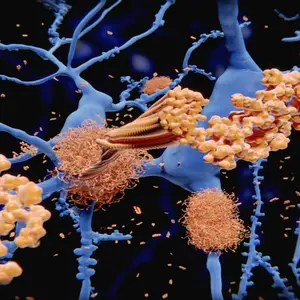

Emerging
Music and Health: What You Need to Know
 By
KnoWEwell
By
KnoWEwell
Can music be good for you?
Yes, according to a growing body of research. Listening to or making music affects the brain in ways that may help promote health and manage disease symptoms.
Performing or listening to music activates a variety of structures in the brain that are involved in thinking, sensation, movement, and emotion. These brain effects may have physical and psychological benefits. For example, music causes the release of brain chemicals (neurotransmitters and hormones) that can evoke emotional reactions, memories, and feelings and promote social bonds. Music can even affect the structure of the brain. Certain structures in the brain have been found to be larger in musicians than nonmusicians, with particularly noticeable changes in people who started their musical training at an early age.
Increasing evidence suggests that music-based interventions may be helpful for health conditions that occur during childhood, adulthood, or aging. However, because much of the research on music-based interventions is preliminary, few definite conclusions about their effects have been reached. Many reports on the potential benefits of music-based interventions come from observations of individuals or small groups of people. Evidence of this type is valuable for suggesting new ideas, but carefully designed, scientifically rigorous studies of larger numbers of people are needed to provide stronger evidence on whether music-based interventions are effective for specific purposes.
What is music therapy?
Music therapy is a health profession in which music is used within a therapeutic relationship to address physical, emotional, cognitive, and social needs. The term “music therapy” is not a description of a specific type of intervention. Instead, it indicates the education, training, and credentials of the therapist who is delivering the intervention.
Music therapy may involve a variety of different activities, including music improvisation, music listening, song writing, music performance, and learning through music. Music therapists may work in many different settings, such as hospitals, outpatient clinics, nursing homes, senior centers, rehabilitation facilities, or schools.
Some of the music-based interventions described below fit the definition of music therapy, but others do not. For example, music-based interventions that involve listening to recorded music are often delivered by health professionals other than music therapists (such as nurses), and therefore do not fit the definition of music therapy.
Can music be harmful?
In general, research studies of music-based interventions do not show any negative effects. However, listening to music at too high a volume can contribute to noise-induced hearing loss.
In addition, because music can be associated with strong memories or emotional reactions, some people may be distressed by exposure to specific pieces or types of music. Extensive playing of musical instruments can lead to pain and injury. Music-based interventions that involve exercise or other types of movement could also lead to injury if appropriate safety precautions are not taken.
What does research show about music-based interventions for people with health conditions?
The preliminary research that has been done so far suggests that music-based interventions may be helpful for anxiety, depressive symptoms, and pain associated with a variety of health conditions, as well as for some other symptoms associated with dementia, multiple sclerosis, Parkinson’s disease, and other conditions.
Pain
As mentioned in other sections, there’s evidence that music-based interventions may help to relieve pain associated with specific health conditions. The two review articles listed below describe evidence indicating that music may be helpful for pain more generally. Newer research continues to find evidence that music may be helpful for pain from a variety of causes, but not every study has shown a beneficial effect.
- A 2016 review looked at 97 studies (9,184 participants) of music-based interventions for acute or chronic pain associated with a variety of health problems and medical procedures. The overall evidence suggested that music-based interventions may have beneficial effects on both pain intensity and emotional distress from pain and may lead to decreased use of pain-relieving medicines.
- A 2017 review of 14 randomized trials (1,178 participants) of music-based interventions for various types of chronic pain found that the interventions reduced self-reported chronic pain and associated depressive symptoms, with a greater effect when the music was chosen by the participant rather than the researcher. The study participants had a variety of conditions that can cause chronic pain, including cancer, fibromyalgia, multiple sclerosis, or osteoarthritis, and most of the interventions involved listening to recorded music.
- Many, but not all, newer studies of music-based interventions for pain have had promising results. For example, in recent studies, music-based interventions were helpful for pain associated with childbirth, cancer chemotherapy, a procedure in which shock waves are used to break up kidney stones, retrieval of eggs for in vitro fertilization, treatment of nose fractures, and sickle cell disease. However, music didn’t seem to be helpful for reducing moderate pain further after use of a lidocaine spray for loop electrosurgical excision (a gynecological procedure), and the results of studies on pain during cystoscopy (a procedure in which a tube is inserted into the bladder) and pain during colonoscopy were inconsistent.
Anxiety
Music-based interventions have been evaluated for their effects on anxiety in a variety of disease conditions and health care settings. Some examples are given in this section, and others are discussed in the sections on specific health conditions. Most studies have had promising results, except for studies on anxiety associated with dental care.
- A 2013 review of 26 studies (2,051 participants) showed that listening to recorded music significantly reduced anxiety in people who were waiting to have surgery. However, there was potential for bias in most of the studies because the investigators who performed the studies knew which participants had listened to music.
- A 2016 review of 17 studies (1,381 participants) that evaluated the effect of music-based interventions on anxiety in adults with cancer suggested that the interventions may have a large anxiety-reducing effect. However, there was a high risk of bias in the studies.
- A 2015 review of five studies (290 participants) in people who were having dialysis treatments suggested that listening to music reduced anxiety. However, these studies have limitations because of their small size and high risk of bias.
- A 2018 review concluded that it’s unclear whether listening to music is helpful for dental anxiety. Some studies have suggested that listening to music as a distraction may not be adequate to reduce anxiety in children or highly anxious adults who are having dental care. More active types of music-based interventions (for example, a music-assisted relaxation technique that’s taught to the patient in advance) might be helpful in dental settings but have not been evaluated in formal studies.
Autism Spectrum Disorder (ASD)
It’s uncertain whether music-based interventions are helpful for people with ASD.
- A 2021 review of 22 studies (850 participants) on music therapy for children with ASD was unable to reach any definite conclusions on whether adding music therapy to their care is beneficial, although some studies had promising results. For example, some studies of educational music therapy (involving techniques such as musical games) showed possible benefits on the children’s speech, and some studies of improvisational music therapy (in which children produce music) showed possible benefits on social functioning.
- One particularly notable study of music therapy for children with ASD (which was included in the review described above) was a multinational trial involving 364 children from nine countries. It is the largest study completed so far, and its design was especially rigorous. In this study, the severity of symptoms related to difficulties in social communication did not differ between children who received music therapy along with standard care and those who received standard care alone.
Cancer
Preliminary evidence suggests that music-based interventions may be helpful for several types of distress in people with cancer.
- A 2021 review of randomized controlled trials (studies in which participants were randomly assigned to a music-based intervention group or a control group), which included 81 trials and 5,576 participants, concluded that in adults with cancer, music interventions may have a large anxiety-reducing effect, a moderately strong beneficial effect on depression, a moderate pain-reducing effect, and a large effect on the quality of life. Most of the trials had a high risk of bias, so their results need to be interpreted with caution. Only seven of the studies included in this review involved children. Two of these studies suggested a beneficial effect on anxiety; no other conclusions could be reached from the small amount of evidence available.
- A 2021 review of 11 studies (491 participants) on music interventions for children and adolescents with cancer, which included some studies that were less rigorous than a randomized controlled trial, found evidence suggesting that music-based interventions may decrease anxiety, perceived pain, and depression symptoms and improve state of mind, self-esteem, and quality of life.
Chronic Obstructive Pulmonary Disease (COPD)
A 2021 systematic review of 12 studies (812 participants) showed that music-based interventions were helpful for shortness of breath, anxiety, and sleep quality in adults with COPD but were not helpful for depression. Because the studies were brief (several days to 12 months) and because researchers measured effects in different ways in different studies, there is some uncertainty about the conclusions.
Cognitive Impairment and Dementia
Much research is being done on the potential benefits of music-based interventions for people with cognitive impairment or various types of dementia, such as Alzheimer’s disease. Limited evidence suggests that music-based interventions may improve emotional well-being, behavioral challenges, and quality of life in people with these conditions. Whether the interventions have benefits for cognitive functioning is unclear; effects might depend on the population studied or the type of intervention used.
- A 2018 review evaluated 22 studies (1,097 participants) of music-based interventions for people with dementia who were living in institutions. Some of the interventions were receptive (listening to music), some were active (singing, playing instruments, moving to music, etc.), and some were a combination of the two. The evidence from these studies indicated that music-based interventions probably reduce depressive symptoms and improve overall behavioral challenges. They may also improve emotional well-being and quality of life and reduce anxiety. However, the interventions may have little or no effect on agitation, aggression, or cognitive function.
- A 2021 review looked at 21 studies (1,472 participants) of people with either mild cognitive impairment or mild or moderate dementia; some of the people studied were living in institutions, but others were living in the community. All the music interventions were active; studies that only involved listening to music were excluded. Nine of the studies (495 participants) were included in a quantitative analysis of effects on cognitive functioning; this analysis indicated that the music-based interventions had a small beneficial effect. There was also some evidence for beneficial effects on mood and quality of life.
Depression
A 2017 review looked at nine studies (421 participants) of music-based interventions in adults or adolescents with depression. There was moderate-quality evidence that adding music-based interventions to usual treatment improved depression symptoms when compared with usual treatment alone. Music-based interventions also helped decrease anxiety levels and improve functioning of people with depression (for example, their ability to maintain involvement in work, activities, and relationships).
Fibromyalgia
A 2020 systematic review of seven studies (334 participants) found evidence that music-based interventions were beneficial for pain, depression, and quality of life in people with fibromyalgia. However, the amount of research was limited, and the quality of the research was low.
Multiple Sclerosis
A 2021 review of music-based interventions for people with multiple sclerosis (10 trials, 429 participants) found consistent evidence that the interventions were beneficial for coordination, balance, some aspects of gait and walking, emotional status, and pain, but no effect was observed for mental fatigability or memory.
Parkinson’s Disease
Researchers are evaluating the potential benefits of several types of music-based interventions for Parkinson’s disease symptoms.
- Rhythmic auditory stimulation. Rhythmic auditory stimulation uses pulsed sounds (such as those produced by a metronome) to help people synchronize their movements to the rhythm of the sounds. This technique is used to help people with Parkinson’s disease improve their ability to walk. A 2021 analysis of five studies (209 total participants) showed significant improvements in gait speed and stride length in people with Parkinson’s disease who participated in rhythmic auditory stimulation. However, the quality of evidence was low, and the number of studies and participants was small.
- Music-based movement therapy. Music-based movement therapy combines physical activities such as dance or rhythmic exercises with music. Therapies that involve physical activity have been shown to be helpful for a variety of Parkinson’s disease symptoms. Adding music to the therapy might have additional benefits by providing auditory cues for movement and making the activities more enjoyable. A 2021 analysis of 17 studies (598 participants) of music-based movement therapy showed evidence of improvements in motor function, balance, freezing of gait, walking speed, and mental health but not gait cadence, stride length, or quality of life.
- Singing. The potential benefits of singing for people with Parkinson’s disease have been studied primarily in terms of effects on speech. In a 2016 review of seven studies (102 participants), five studies found some evidence of a beneficial effect on speech.
Pre-Term Infants
Music-based interventions are widely used in neonatal intensive care units. However, evidence for physiological benefits for newborn infants is limited.
- In a 2020 review of 16 studies (826 infants), 12 of the studies found some evidence of benefits on physiological outcomes (such as heart rate or oxygen saturation), but several of the studies included only small numbers of infants, and the intervention methods used varied from one study to another. The reviewers concluded that the current data s insufficient to confirm physiological benefits. No harmful effects of music-based interventions were seen in the studies included in this review.
Schizophrenia
Music-based interventions have been evaluated as adjunct treatments (additions to usual treatment) for people with schizophrenia. A 2020 review of 18 studies (1,212 participants) indicated that adjunct music-based interventions may improve a group of schizophrenia symptoms known as “negative symptoms,” such as reduced emotion and self-neglect, as well as depression symptoms and quality of life. However, music-based interventions did not reduce “positive symptoms,” such as hallucinations and delusions. The quality of the evidence was low.
Sleep Problems
Listening to music may improve sleep quality in people with insomnia.
- A 2022 review looked at 13 studies (1,007 participants) that examined the effect of listening to recorded music in people with insomnia. The studies suggested music had no effect on insomnia severity compared to no treatment or treatment as usual. Moderate-certainty evidence did suggest, however, that listening to music has a beneficial effect on subjective sleep quality. The studies also provided low-certainty evidence that listening to music might help improve the speed of falling asleep, the length of time spent sleeping, and the amount of time a person is asleep compared to the total time spent in bed.
- It’s common for older people to have trouble sleeping. A 2021 review looked at 16 studies of music-based interventions for sleep in older adults (812 participants); 11 studies evaluated music listening, and the other five evaluated more complex interventions. The results were mixed, with some studies suggesting that the music interventions were helpful, while others did not.
Stress
Music-based interventions, particularly music therapy, may be helpful for improving physical and psychological markers associated with stress, according to two related reviews.
- In a 2020 review with 104 studies (9,617 participants), investigators looked at the effects of a variety of music-based interventions on measures associated with stress, including both physical measures (heart rate, blood pressure, and levels of stress-related hormones) and psychological measures (anxiety, nervousness, restlessness, and feelings of worry). The music-based interventions had a small-to-medium sized beneficial effect on the physical measures and a medium-to-large beneficial effect on the psychological measures.
- A second review looked at 47 studies (2,747 participants) of music therapy (excluding other music-based interventions) and found an overall medium-to-large beneficial effect on stress-related outcomes. The effects were greater than those seen in the larger review. The investigators who performed the review suggested that the opportunity for music therapists to tailor interventions to the needs of individual patients might account for the difference.
Stroke
Music-based interventions may be helpful in the rehabilitation of people who have had a stroke. A 2019 review of 27 studies (730 participants) found positive effects on physical status (upper-limb activity, various aspects of walking, balance), cognition (paying attention, communication), and mood. In particular, rhythmic auditory stimulation (which involves the use of a metronome combined with physical activities) had beneficial effects on gait and balance, and receptive music therapy (which involves listening to music while performing another task) was helpful for mood and some aspects of cognitive function.
Tinnitus
Tinnitus is the symptom that people often describe as “ringing in the ears,” although it can also sound like roaring, clicking, hissing, or buzzing. It can be caused by noise-induced hearing loss, blockage of the ear canal by earwax, ear or sinus infections, or other health conditions, or by starting or stopping various medications. Sometimes, tinnitus has no obvious cause.
- Sound therapies. Various types of sounds, including music, have been used to try to mask tinnitus. However, according to a 2019 review of studies conducted up to that time, the effects of these sound therapies are modest; few people achieve complete remission of tinnitus from sound therapies.
- Notched music therapy. A specific type of music therapy called “notched” music therapy has been suggested as a possible way to reduce the severity of tinnitus. Notched music therapy involves listening to music that has been modified to remove sounds close in frequency to the frequency of the tinnitus sound perceived by the patient. Two recent studies that compared notched music with conventional music did not find notched music to be more helpful in reducing the symptoms or impact of tinnitus. However, some earlier studies suggested that the loudness of tinnitus sounds could be reduced with notched music therapy.
REFERENCES
National Center for Complementary and Integrative Health. (2022, September). Music and health: what you need to know. National Institutes of Health. U.S. Department of Health and Human Services. https://www.nccih.nih.gov/health/music-and-health-what-you-need-to-know









